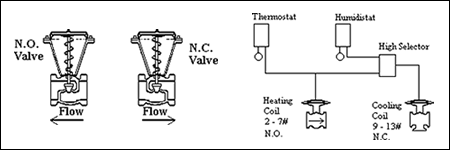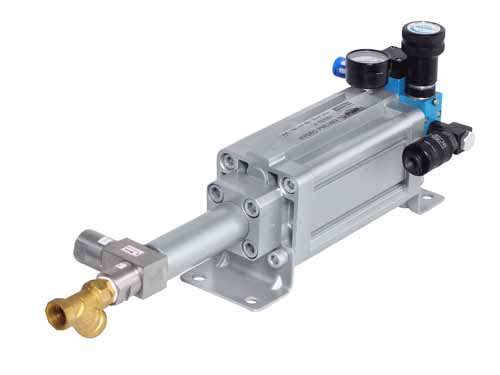Pneumatic Hvac System
A pneumatic HVAC system is a type of control system used in heating, ventilation, and air conditioning that utilizes air pressure to operate various components. These systems were commonly used in older buildings and have since been replaced by newer, digital technologies. However, many buildings still use pneumatic HVAC systems, and it's important to understand how they work and the benefits they offer.
Understanding the Pain Points of Pneumatic HVAC Systems
One of the main pain points associated with pneumatic HVAC systems is that they are not as precise as modern digital systems. This lack of precision can lead to inconsistencies in temperature control and airflow, which can result in discomfort for building occupants. Another pain point is that pneumatic systems require regular maintenance to ensure that they are operating correctly, which can be time-consuming and costly.
What is the Target of Pneumatic HVAC Systems?
The target of pneumatic HVAC systems is to provide heating, ventilation, and air conditioning to a building using air pressure to operate various components. These systems use a central air compressor to distribute air through ductwork and valves to regulate temperature and airflow.
Summary of Main Points
Pneumatic HVAC systems use air pressure to regulate temperature and airflow in a building and are commonly found in older buildings. While they offer some benefits, they require regular maintenance and are not as precise as modern digital systems.
The Benefits of Pneumatic HVAC Systems
One benefit of pneumatic HVAC systems is that they are simple to operate, making them a good option for buildings with limited resources or those that do not require precise temperature control. Additionally, these systems can be more energy-efficient than digital systems since they do not require electricity to operate.

The Drawbacks of Pneumatic HVAC Systems
On the other hand, one of the main drawbacks of pneumatic HVAC systems is their lack of precision. These systems rely on air pressure to operate various components, which can lead to inconsistencies in temperature control and airflow. Additionally, pneumatic systems require regular maintenance to ensure that they are operating correctly, which can be time-consuming and costly.

How do Pneumatic HVAC Systems Work?
Pneumatic HVAC systems use a central air compressor to distribute air through ductwork and valves to regulate temperature and airflow. When the thermostat detects a change in temperature, it sends a signal to the pneumatic controller, which then sends a signal to the air compressor to adjust the air pressure and operate the necessary components to maintain the desired temperature.
The Importance of Regular Maintenance for Pneumatic HVAC Systems
Since pneumatic HVAC systems rely on air pressure to operate, it's crucial to ensure that all components are working correctly. Regular maintenance is necessary to prevent leaks, blockages, and other issues that can compromise the system's effectiveness. This maintenance may include replacing air filters, checking for leaks, and cleaning ductwork and valves.

Question and Answer Section about Pneumatic HVAC Systems
Q: What are some common issues that can arise with pneumatic HVAC systems?
A: Common issues with pneumatic HVAC systems include leaks in ductwork or valves, blockages in airflow, and malfunctions in the controller or thermostat.
Q: Can pneumatic HVAC systems be used in modern buildings?
A: While pneumatic HVAC systems are not as precise as digital systems, they can still be used in modern buildings. However, it is crucial to note that these systems require regular maintenance to ensure that they are operating efficiently.
Q: Are pneumatic HVAC systems energy-efficient?
A: Pneumatic HVAC systems can be more energy-efficient than digital systems since they do not require electricity to operate. However, their lack of precision can lead to inefficiencies, so it's essential to ensure that the system is operating correctly.
Q: What is the main benefit of pneumatic HVAC systems?
A: The main benefit of pneumatic HVAC systems is that they are simple to operate, making them a good option for buildings with limited resources or those that do not require precise temperature control.
Conclusion of Pneumatic HVAC Systems
Pneumatic HVAC systems offer several benefits, including simplicity and energy efficiency. However, they also have drawbacks, such as a lack of precision and the need for regular maintenance. Understanding how these systems work and their strengths and weaknesses can help building owners and managers make informed decisions about their HVAC systems.
Gallery
What Are Pneumatic Control Systems? | ACS Southeast

Photo Credit by: bing.com / pneumatic control systems hvac tech know acs southeast
Introduction To Pneumatic Control Systems: Clip 2 Of 5 - YouTube

Photo Credit by: bing.com / controls refrigeration system basics basic air pneumatic control systems flow components introduction conditioning used industry compression they
Pneumatic HVAC Controls Operation And Calibration | Tempcon - HVAC

Photo Credit by: bing.com / hvac pneumatic controls control calibration operation systems background
AutomatedBuildings.com Article - DDC FOR HVAC SYSTEMS
Photo Credit by: bing.com / ddc pneumatic systems hvac automatedbuildings zone single heating figure differ important ways some
Heating Ventilation And Air-conditioning (HVAC) || Enman Pty Ltd
Photo Credit by: bing.com / hvac ventilation air conditioning heating system enman complete software au
0 Response to "Pneumatic Hvac System"
Posting Komentar